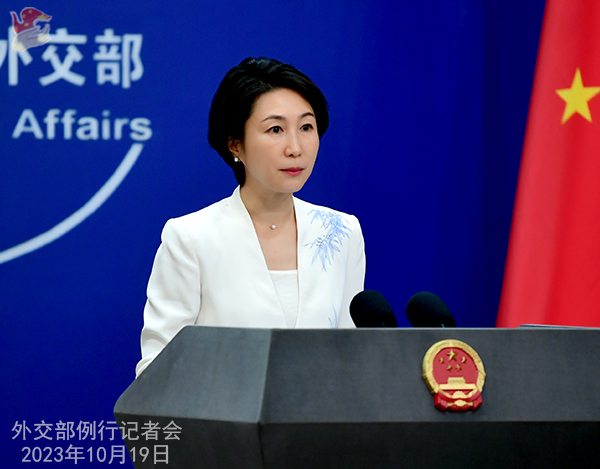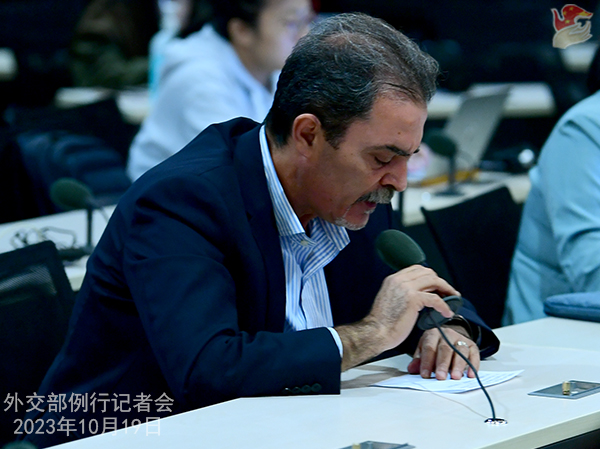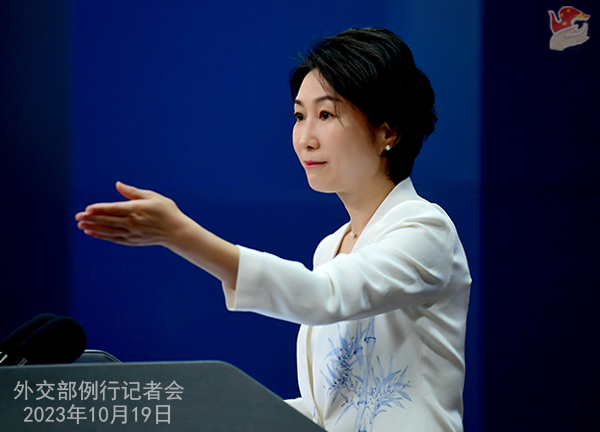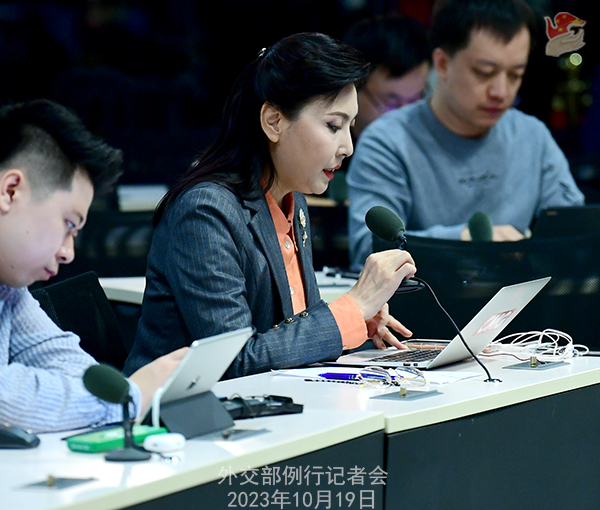| Foreign Ministry Spokesperson Mao Ning’s Regular Press Conference on October 19, 2023 |
| 2023-10-19 19:38 |
|
CCTV: The Third Belt and Road Forum for International Cooperation was successfully held from 17 to 18 October and received great international attention. Can you give us more details about the Forum? Mao Ning: Thank you for closely following the third Belt and Road Forum for International Cooperation. This BRF was attended by over 10,000 registered representatives from 151 countries and 41 international organizations. The scale of participation has once again showcased the tremendous appeal and global influence of Belt and Road cooperation. As Foreign Minister Wang Yi said at the press conference yesterday, the BRF is a conference of unity, of win-win outcome and of development. It is another important milestone in the process of Belt and Road cooperation. The clearest message from this Forum is unity, cooperation, openness and win-win outcome. Amid great transformations unseen in a century, Belt and Road cooperation will always bring stability and positive energy to the world. The most important consensus of this Forum is to usher in a new stage of high-quality Belt and Road cooperation. As the BRI enters a new stage, it will definitely create more opportunities and bring more good news for the world. The most ambitious vision of this Forum is to realize global modernization through joint efforts. President Xi Jinping proposed for the first time that global modernization should be pursued through the joint efforts of all countries to enhance peaceful development and mutually beneficial cooperation and bring prosperity to all, setting the direction for high-quality Belt and Road cooperation. The defining feature of this Forum is that it is action-oriented, efficient and pragmatic. During this Forum, 458 outcomes have been reached, far exceeding the number of the last Forum. These tangible cooperation outcomes will certainly provide sustained impetus for global growth and common development across the world. The success of this Forum proves once again that China has followed the right direction in advancing Belt and Road cooperation, that BRI partners have shown firm commitment to participation, and that high-quality Belt and Road cooperation enjoys bright prospects. Standing at a new historical starting point, we look forward to working with all parties to embark on a new journey of Belt and Road cooperation and usher in a better future of joint progress toward global modernization. CCTV: On October 18, the UN Security Council voted on a draft resolution proposed by Brazil on the Palestinian question. Twelve countries, including China voted in favor of the draft resolution, but as the US used its veto power, the resolution was not adopted. What is China’s comment? Mao Ning: China’s Permanent Representative to the UN has explained China’s position at length after the vote. The Palestinian-Israeli conflict continues to escalate, causing widespread civilian casualties and humanitarian crisis and a severe blow to the region’s peace and stability. China supports the Security Council in playing a responsible role and all efforts aimed to deescalate the situation and restore peace, and welcomes any initiative that helps protect civilians and ease the humanitarian crisis. For several days running, the Security Council has been engaged in in-depth discussions on the draft of a resolution on the Palestinian question and building up consensus. The overwhelming majority of countries, the Arab countries in particular, support the Security Council in taking action as soon as possible. China is deeply disappointed at the US blocking the Security Council resolution. As tensions continue to escalate, the Security Council needs to listen to the call from the many Arab countries and the Palestinian people, and live up to its duty and play its role in bringing about a ceasefire, protecting civilians and averting an even worse humanitarian disaster. TASS: President Xi Jinping and Russian President Vladimir Putin had fairly long talks, during which the two heads of state exchanged views on the Palestinian-Israeli situation. Could the foreign ministry share more information on this part of the talks? How does China view its coordination with Russia on the Palestinian-Israeli conflict? Mao Ning: There is a readout on President Xi’s talks with President Putin and you may refer to that. I can tell you that the talks between the two heads of state were candid, friendly and deep-going. The two sides exchanged views on bilateral relations, practical cooperation, Belt and Road cooperation, multilateral coordination and the Palestinian-Israeli situation. Both sides agreed to pursue high-quality cooperation, forge stronger synergy between the Belt and Road cooperation and the Eurasian Economic Union and continue to step up communication and coordination within the United Nations, the Shanghai Cooperation Organization, the G20 and other multilateral frameworks and add new dimensions to our cooperation. Al Jazeera: During President Biden’s visit to Israel, the US and Israel jointly proposed the relocation of people in Gaza to Egypt, but Egypt explicitly opposed it. What is China’s comment on this proposal? Mao Ning: We believe that the pressing priority is for all parties concerned to stop fighting as soon as possible, earnestly abide by the international humanitarian law, do their utmost to protect civilians and prevent a wider humanitarian disaster. The international community, especially non-regional major countries with influence, should play their role in this regard. We appreciate Egypt’s active mediation efforts and its coordination work to ease the humanitarian situation in the Gaza Strip.
Hubei Media Group: The UK and some Western countries have raised concern over Xinjiang-related issues at the Third Committee of the UN General Assembly. Meanwhile, over 100 countries voiced support at the committee for China’s position in various ways and expressed opposition to interference in China’s internal affairs under the pretext of human rights. What’s China’s comment? Mao Ning: On October 17, at the Third Committee of the 78th session of the United Nations General Assembly, Pakistan delivered a joint statement on behalf of over 70 countries. They pointed out that issues related to Xinjiang, Hong Kong and Xizang are China’s internal affairs. They spoke against the politicization of human rights issues, the application of double standards and interference in China’s internal affairs in the name of human rights. Many other countries expressed support for China by making statements either individually or collectively. A total of over 100 member states spoke up for justice and voiced support for China at the UN. The attempt of a handful of Western countries to hold back and contain China under the pretext of human rights was thwarted once again. In a world fraught with crises and challenges, solidarity and cooperation matter more than ever. The UK and a handful of Western countries, based on disinformation and driven by the Cold War mentality, have put themselves on the opposite side of the international community by inciting confrontation at multilateral fora. These countries do not acknowledge their own human rights woes such as persistent systemic racism and racial discrimination and violation of migrants’ rights. They have yet to show the slightest repentance over grave human rights violations during the era of colonialism and its vestiges, nor have they offered any sincere apologies or compensation. The international community has raised concern over and over on this. We urge the UK to face squarely and address its own human rights issues and stop politicizing or instrumentalizing human rights issues. We Chinese have every confidence in the path we have chosen and take great pride in the achievements we have made. We will stay firmly committed to our chosen path and set course. China has been elected Member of the Human Rights Council for the 2024-2026 term. We will continue to uphold the common values of all humanity, actively participate in global human rights governance, and promote the sound development of the international human rights cause. RIA Novosti: When addressing the opening ceremony of the third Belt and Road Forum for International Cooperation in Beijing, Russian President Vladimir Putin said that the Northern Sea Route will soon open to traffic and invited other countries to participate in the development of the project. What’s China’s comment? Is China willing to cooperate with Russia in the framework of the Northern Sea Route? Mao Ning: I’d refer you to competent authorities for the specifics. As a principle, China stands ready to have Arctic cooperation with Russia as well as cooperation in other areas under the principles of mutual respect, equality and mutual benefit. KBS: Recently US President Joe Biden visited Israel and the US government indicated it will try to play the role of an arbitrator. What is China’s comment on the US role as an arbitrator in light of the current conflict? Mao Ning: In dealing with international and regional hotspot issues, major countries need to be objective and just, exercise calm and restraint and lead by example in abiding by international law. We hope that the US can play a constructive role and bring issues back to the track of political settlement. Al Jazeera: Following the attack on a hospital in Gaza, Israel is creating an even greater humanitarian disaster in Gaza. What is China’s attitude towards the Israeli government in response to what Israel has done? Mao Ning: China is shocked by and strongly condemns the attack on the hospital in Gaza, which has caused massive casualties. We mourn for the victims and extend sympathies to the injured. China calls for an immediate ceasefire and cessation of hostilities, fulfillment of obligations under the international humanitarian law and every possible effort to protect civilians and avert an even worse humanitarian disaster. Reuters: It was reported that a Japanese national employed by Astellas Pharma, who was detained in Beijing in March, was officially arrested for suspicion of espionage. Can you confirm this and provide more information on the espionage charge? Mao Ning: We have shared information about the case before. Relevant Chinese authorities adopted compulsory measures in accordance with the criminal procedure law against the Japanese citizen suspected of engaging in espionage activities. China is a country under the rule of law. We will handle the case in accordance with law and protect the lawful rights and interests of the person concerned. For more specifics, I’d refer you to competent Chinese authorities.
The Paper: US California Governor Gavin Newsom’s spokesperson announced that the Governor will visit China next week. What’s China’s comment? Mao Ning: China welcomes Governor Gavin Newsom and his delegation to China and hopes that the visit will produce good results and bolster California’s exchanges and cooperation with China. China encourages interactions between Chinese and Americans from all walks of life and supports sub-national efforts of expanding exchanges and cooperation in such fields as economy and trade, science and technology, education, culture and youth, so as to bring more benefits to the two peoples and inject more positive energy for the China-US relations. AFP: Zhai Jun, Special Envoy of the Chinese Government on the Middle East Issue, is scheduled to visit the Middle East this week. Do you have any details on his visit? Mao Ning: Thank you for your interest in the visit by Special Envoy Zhai Jun. We will release information in a timely manner. I believe it won’t be long before more details become available. Reuters: Chinese experts are currently participating in an IAEA-led survey in Japan analyzing fish that landed in Fukushima following the release of water from the nuclear plant. Since China has been sharply critical of the IAEA’s support of Japan’s decision to release the water, why do Chinese experts continue to take part in these IAEA missions? Mao Ning: China’s opposition to Japan’s dumping the Fukushima nuclear-contaminated water into the ocean is consistent and clear. It has been almost two months since Japan started the ocean discharge. The international community demands for an international monitoring arrangement that will stay effective for the long haul and ensure substantive participation of Japan’s neighboring countries and other stakeholders. We believe that the IAEA should play its due role and work constructively for this and step up to its responsibility of providing rigorous supervision on Japan’s ocean discharge. Japan should work in full coordination and avoid irreversible damage caused by the ocean discharge. Reuters: Why was there no leaders’ roundtable and joint communiqué after this year’s Belt and Road Form, unlike in previous years? Mao Ning: China has issued a Chair’s Statement on the forum, which you may refer to. AFP: US Department of the Treasury announced yesterday that it will sanction 11 individuals, eight entities, and one vessel that are enabling Iran’s ballistic missile and unmanned aerial vehicle (UAV) programs, including companies and individuals based in Chinese mainland and Hong Kong, China. What is your response? Mao Ning: We continue to strongly oppose the US’s illegal unilateral sanctions. We will firmly protect the lawful rights and interests of Chinese businesses and citizens.
|
 | ||||||||||||
 | ||||||||||||
|



